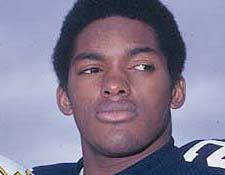Kerry Marbury was there!

Former WVU, Monongah star Marbury reflects on life
October 6, 2011
By Bob Hertzel
Times West Virginian
MORGANTOWN — Sometime less than an hour after freshman Dustin Garrison had rushed for 291 yards against Bowling Green in his first collegiate start for West Virginia University, someone asked him if he knew who Kerry Marbury was."Naw," said Garrison, not at all surprisingly, considering he was born in Louisiana just 19 years ago and went to high school in Texas, while Marbury was a local hero from a long-gone era, his claim to fame being that he had held the WVU single-game rushing record at that same 291 yards for 33 years until Kay-Jay Harris came along and broke it in 2004 with a 337-yard outburst against East Carolina.
In fact, after Harris had shattered Marbury's record, he reached him on the phone.
According to his memory when reached this week at Fairmont State, where he teaches, Marbury relates the conversation as going like this:
"I'm sorry, Mr. Marbury, that I broke your record."
"Kay-Jay, congratulations. Break the rest of them. I'm trying to fade into oblivion."
But we're not going to let that happen, so for Garrison and all the other youngsters who don't know the tale of Kerry Marbury, the time has come to bring the Kerry Marbury story back to light, for it carries lessons that go far, far beyond the game of football and show how fickle fame can be, how misguided one's dreams may become and how life is, in the end, what you make it.
Marbury sees self in Garrison
Let it be known that Marbury watched as Garrison burst upon the public awareness, stepping out of the obscurity of a football backup onto the highlight reels of ESPN. He watched and he marveled, for in many ways he saw some of himself in Garrison.Marbury, in his day, was a water bug of a running back, blessed with 9.6 speed in the 100, which was run in yards, not meters, in the late 1960s and early 1970s. He was small, listed at 5-10 and 180, which meant he was shorter and lighter than that.
"I may have been way ahead of my time in those days because I was a lot faster than a lot of those people," Marbury said.
But he didn't make his runs against the kind of athletes that Garrison, who is listed at 5-8 and 175, faces in today's Division I football.
"It was just amazing to see him make the moves and the runs he made at his size because now football players are bigger, stronger and faster," Marbury said.
Of course, Marbury didn't have the kind of offensive linemen blocking for him that Garrison has.
"We didn't have the linemen that they do now. I think all the time if we had had the linemen they have now I may have stayed my senior year," he said, only half joking.
Setting the record
Marbury set his mark on Oct. 23, 1971, against Temple, rushing for 291 yards on just 22 carries. He had 200 yards by halftime but suffered a leg injury that forced him out for part of the third quarter, keeping him from reaching 300 yards.
According to John Antonik of the WVU sports information staff, some think he might have reached 400.
Certainly the performance was no fluke.
"I always felt that Kerry had more natural God-given ability than any other running back at West Virginia University," Donnie Young, a former assistant who personally saw Amos Zereoue, Avon Cobourne, Artie Owens, Robert Walker and Robert Alexander, once said. "Kerry could go from a standstill to a full sprint quicker than anyone I'd ever seen."
The next year Marbury teamed with wide receiver Danny Buggs to give WVU one of its fastest teams ever, earning a spot in the Peach Bowl, but that would be a game that changed Marbury's life and outlook forever.
Leaving WVU early
West Virginia played North Carolina State and was walloped, 49-13, Marbury gaining only 69 yards on 13 carries. A young Bobby Bowden was the coach then and was criticized for his team's behavior and lack of discipline in Atlanta leading up to the game.The story is that Bowden instituted tougher rules and handed out suspensions, one to a friend of Marbury's that reportedly led to him leaving the team and heading to Canada to play for the Toronto Argonauts of the Canadian Football League.
Marbury revealed the other day, however, that it was nothing as petty as that which drove him out of WVU, which had the state newspapers ripping him for leaving.
"I was very disappointed after the Peach Bowl loss," Marbury said. "I hurt my ankle in the last game of the year, the Syracuse game, and I shouldn't even have been playing in the Peach Bowl. When they brought me into the locker room before the game, they stuck a needle, probably four inches long, into my ankle. I could hear the bones pressing up against the needle."
That really got to Marbury.
"I was so distraught over that. I thought, ‘They treat race horses better than this,'" he said. "That ultimately led to my leaving. After the shot, I couldn't tell whether I had a foot, let alone run. If I had broken it I wouldn't have known it until the novocaine wore off."
His year in Canada was a good one.
"I wouldn't trade the experiences I had in Toronto and Ottawa for anything," he said.
He had not traveled much until then. He had been raised on welfare in Monongah, best friends with current Alabama coach Nick Saban and coached in youth football by Nick Sr.
His heart was set on football, but even then in early days there was a signal that maybe things aren't all they are cracked up to be.
"I remember with Nick Saban, back in Pop Warner, we'd bus ourselves to Pittsburgh to play in a playoff game. We didn't have money then. We stayed at the other players' houses up there," he said.
"We eventually won the game, and I had stayed at their star running back's house. They weren't very happy we had won, and when I got back there they had my stuff sitting out on the porch."
That, of course, was years before they shot his ankle up at WVU and sent him out to play, caring far more about the game than his welfare.
A near death experience
It would get worse. After a year in Canada and a failed attempt at the NFL, he signed with the Birmingham Vulcans of the WFL."We were in a hotel at camp and I was really sick down there," he said. "You know, as an athlete, you know your body better than a doctor does. I was sick, throwing up, perspiring profusely, feeling very weak."
He told this to the coach and the trainer. They responded by telling him it was an important scrimmage and he had to play.
"I made it through and did pretty well, but the trainer comes out and says, ‘You need to come off the field.' I looked at him, like, ‘You really think so?' The players helped me to the shower. They finally took me to the emergency room in Birmingham. I'm throwing up on the gurney, but the doctor says they couldn't find anything wrong with me."
He returned to the hotel.
"I'm there crawling around on the floor, couldn't talk," he explained. "Finally, the next day, the team doctor came and said my appendix had ruptured. I had no idea. The team doctor told me if I wasn't in as good a shape as I was I would have died."
Now Marbury was completely disillusioned.
"Since I was 5, football was all I wanted to do. Jim Brown was my hero. I always wanted to be like him," he said. "But I didn't know what pro football really was. I finally got there and saw it wasn't all it was cracked up to be. It's not the best players play. There's a lot of politics involved. They treat you like a number. You're not a human being anymore."
The turning point
Now life began getting away from Marbury. He got into drugs and wound up serving a short prison sentence."I don't mind talking about my prison experience. I always say prison was not an abyss for me, but the most important turning point in my life," he said. "I was so disillusioned with sports and football, in particular. People say how can you do this or that, but once you come to that realization that all you really wanted was not real, it's easy to succumb."
Upon being released from prison, Marbury was determined to turn his life around.
"If you are raised by someone with values and morals, even though you may deviate from life's chosen path, those morals and values will come back to you at some point. That's what happened with me," he said.
With guidance from Dr. Paul Edwards and Dr. Robert J. Dillman, he turned his life around.
"Dr. Dillman was the president here. He knew all my ups and downs. And Paul Edwards, who I still call my mentor, has been like my dad since I got out of prison," Marbury said. "My cousin, who has passed, when I first got out of prison told me I had to go see Dr. Edwards. I was thinking, ‘Why, when everyone else in my life has disappointed me? What makes him different?'
"Well, when I met him, I found out what made him different. He didn't know me from Adam, led me through all the hoops, got me registered in school. I wanted to make my mom proud and people who I loved and loved me proud so they didn't just think of me as someone who had been in prison."
Dr. Edwards encouraged him to go to graduate school and get a master's, then approached Dr. Dillman to get him hired as a teacher.
He became a productive member of the community, one who had the right values, as evidenced this year when he lined up tickets for the Alabama-Penn State game.
For two months he planned the trip, only to find out the week of the game that the youth team he coaches, the Black Diamonds, also had a game at the same time.
Nick Saban and Joe Paterno had to play their game without him. He had learned there are more important things in life.


